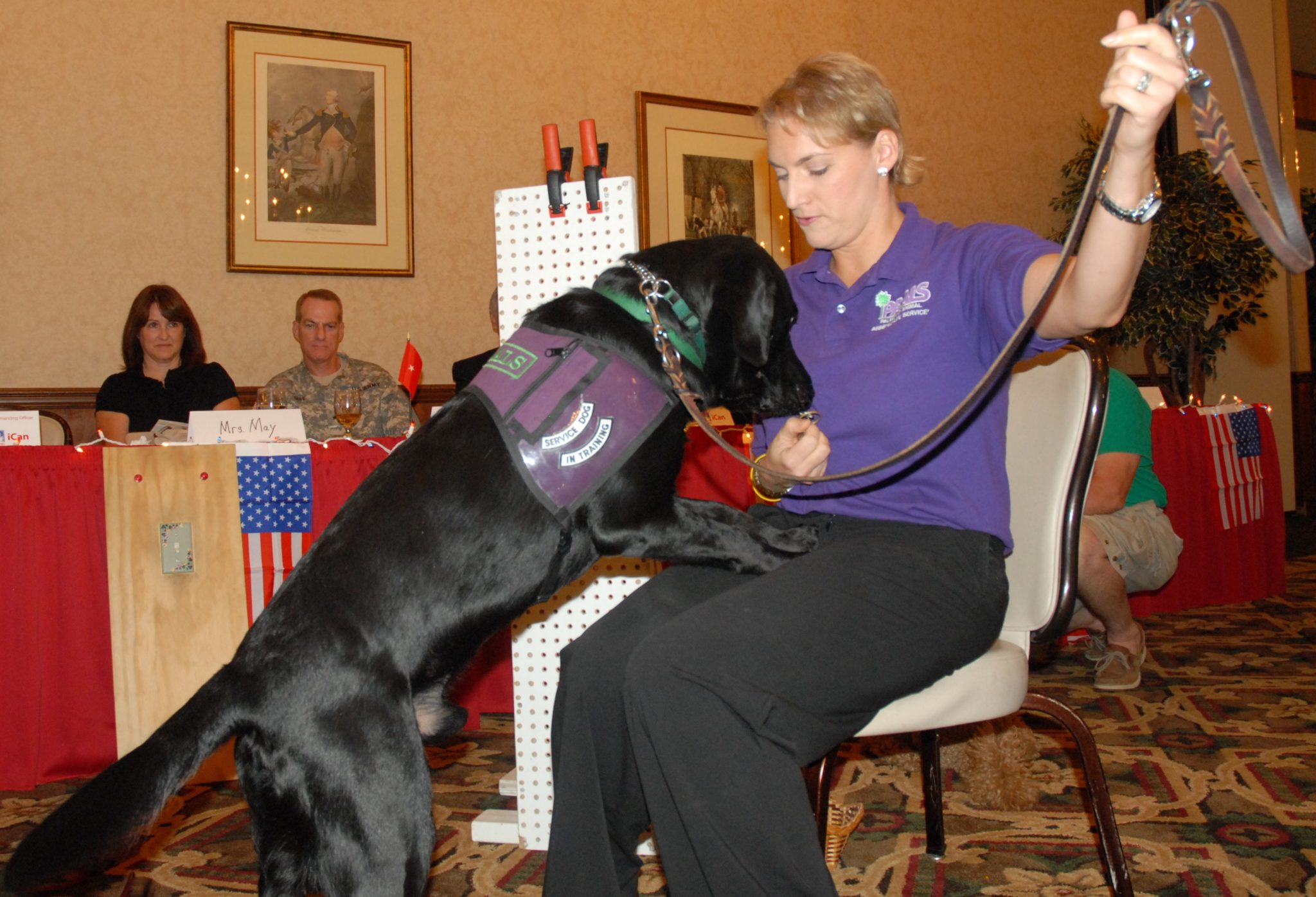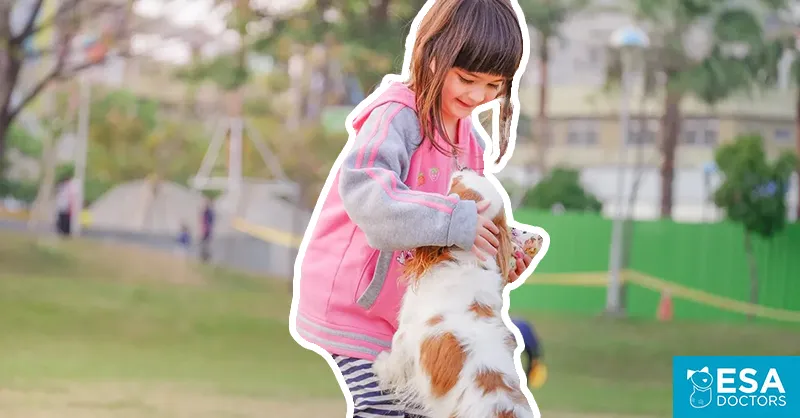Service animals are particularly trained animals that help people with everyday activities, especially people with disabilities. In general, service animals are independently trained to perform functions to assist persons who are qualified individuals with a disability. According to ADA Requirements (2011), only dogs are considered to be service animals; while other animals such as miniature horses, monkeys and cats have limited federal rights. The major tasks performed by these animals include: guiding blind people; alerting as well as caring for a person who is having seizure; alerting deaf people; calming a person with PSTD during an anxiety attack; and pulling a wheelchair.
What is a Service Dog?
Service dogs that assist people to deal with mental or emotional issues are referred to as psychiatric service dogs. These animals are specifically taught to identify and respond to a person’s particular behavior. Therapy animals are defined as animals that are taken to disaster sites, schools and hospitals to provide emotional healing to different people. The most popular therapy animals are comfort dogs. These dogs are known to assist people who have survived tragedies and in animal assisted therapy. Comfort dogs are normally trained; however, they do not carry out duties with respect to a single person; hence they are not legally recognized as service animals.
What is an Emotional Support Animal?
On the other hand, animals that exclusively provide emotional or mental support are referred to as emotional support animals. Unlike other service animals; these ones are not trained and they are only meant to provide companionship for a person with documented mental health problems. These animals are neither categorized as official service animals nor pets. Nevertheless, they can be allowed in residences and airplanes if properly registered. Companion animals are simply pets; however, the term is currently used to define animals who share our lives and homes. As discussed above, there are varieties of roles that dogs can take, but are not that of a service animal covered under the ADA requirements.
There are various charges, exclusions and inquiries associated with service animals that you should know. There are minimal inquiries allowed as far as assist animals are concerned, and they include: what type of assist animal is it and what type of services is the animal trained to perform. Fear and allergies are not considered valid explanations for refusing service or denying access to individuals using service animals. A physically impaired individual should not be asked to take away his or her assist animal from the premises apart from the following situation: the assist animal is not housebroken and the assist dog is out of control.
There are various characteristics that you should take into consideration when choosing the best service animals/ dogs. The most appropriate characteristics should include: friendly, adaptable, easy to live with, confident, and polite. A good service animal needs to be friendly, and he or she should cooperate effectively with the partner. However, the friendship of this kind of animal should exhibit a balance of self-control and friendliness. A good assist animal should be able to adapt with the partner’s environment without any problems, and at the same time the animal needs to be confident. A service animal, a therapy dog or an emotional support animal should be able to make life easier for the handler. Therefore, there is every need for the animal to be easy to share life with.
There is every need to know what predicts the success of service animal partnership, especially dogs. Some people are well suited to partner with a service dog while other people are not. The main issues that may be decreased or improved by a human-service dog partnership are health, community integration and stigma issues. Unlike humans, service animals/ dogs can adapt to a given human behavior with the intent of providing the services the dog is intended to provide.





I have a 5 year old Shepard/lab mix. Can they be trained at that age to be an emotional support dog?
Emotional support animals do not need specific training, they are intended to provide support through companionship. Like all animal companions however, ESAs should be trained to be well-behaved in all situations.
I have a question I have a sezisure alert service dog and is registered and proterty manger was given all proof and 3 months later I am being told I need a prescription from Dr saying he has be prescribed to me has a service dog is this right? And I have been charged pet deposit and pet rent
Service dogs do not require a prescription. Landlords cannot charge pet deposits or pet rent for service dogs or emotional support dogs.
I just submitted my letter to my landlord. They responded by asking me if I would be taking my ESA to work with me to help me with my condition. Can they ask this? How should I respond?
Your landlord cannot require you to take your ESA to work. They cannot ask medical information regarding your disability or why you need your ESA.
If I register my pup as a ESA dog, does that make me a disabled person? For example, do I have to list or declare myself as mentally handicapped or disabled when i apply for jobs and such?
You are not required to register your ESA dog with any outside organization. Your medical information is private and should not be shared with anyone but you and your doctor. Your future and current boss cannot inquire about your medical records or information.
Hi, so I’ve been looking into making my dog an emotional support pup. I have Horrible anxiety, & have attacks here & there. & she’s always by my side no matter what. I take her places she’s allowed to go. She sleeps with me, she just helps me so much. My problem is, is that were moving & the place that we planned on going to doesn’t accept pets. & I can’t go with her. I’d never give her up. But that leaves us in a bad place, the manager said if I got a letter stating that she is my emotional support dog from a doctor then they’d allow it. I’m not able to get ahold of my primary doctor because something is wrong with that whole situation. & at this point I’m not sure what to do.
Hi Fannacie, please take a few minutes to fill out the questionnaire here: https://esadoctors.com/esa-questionnaire/. Please contact us with any additional questions.
I have a Dachshund/chihuahua mix. She’s about 7months old. My psychiatrist wrote me a ESA note this past Friday so I can take her with me everywhere. Will that be enough proof until I get her registered ?
Shawna, since emotional support animals are not specially trained to provide a service for their handlers, they are not entitled full access and cannot go everywhere you go. Only service animals are allowed full access to go wherever their handlers go.
Hi! I was wondering if it is illegal to charge pet fees to residents who want to rent an apartment if they have a service dog? I need a service dog, and would like a law to be made to not charge extra for such! Thank you!!!
Hi Carrie, handlers with service dogs or emotional support dogs are not required to pay pet fees when renting a home/apartment.
I have anxiety attacks that sometimes leave me immobile almost. Would that qualify me for more of a service dog or an emotional support dog? I have anxiety all the time.
Hi Jasmine, emotional support dogs can be a great source of comfort when an anxiety attack begins. Please take a few minutes to fill out the questionnaire in the link provided below and a licensed mental health professional will evaluate your need for an ESA. Please let us know if you have any additional questions.
ESA Questionnaire
I have depression and have anxiety attack; my sister got me a baby puppy she is so cute it make me so happy playing with her, but now i have to move because where i live they don’t except dog now i have to move or gave rid of my baby dog. i get SSI and i dont have money to move right now and i don’t want to lose my puppy… please what can i do to keep my apartment and my dog
Do I have to register a dog to be an ESA or will a letter from the doctor work?
My sons doctor is doing a letter for me and we are still finding a good for for my son so I don’t have the dog yet but I’m getting the letter tomorrow
Tasha, you are not required to register your ESA in any database. Your letter from your doctor will suffice. Our service is for people that do not have access to a doctor or therapist in their area. Please let us know if you have any more questions. Congrats on your new emotional support animal!